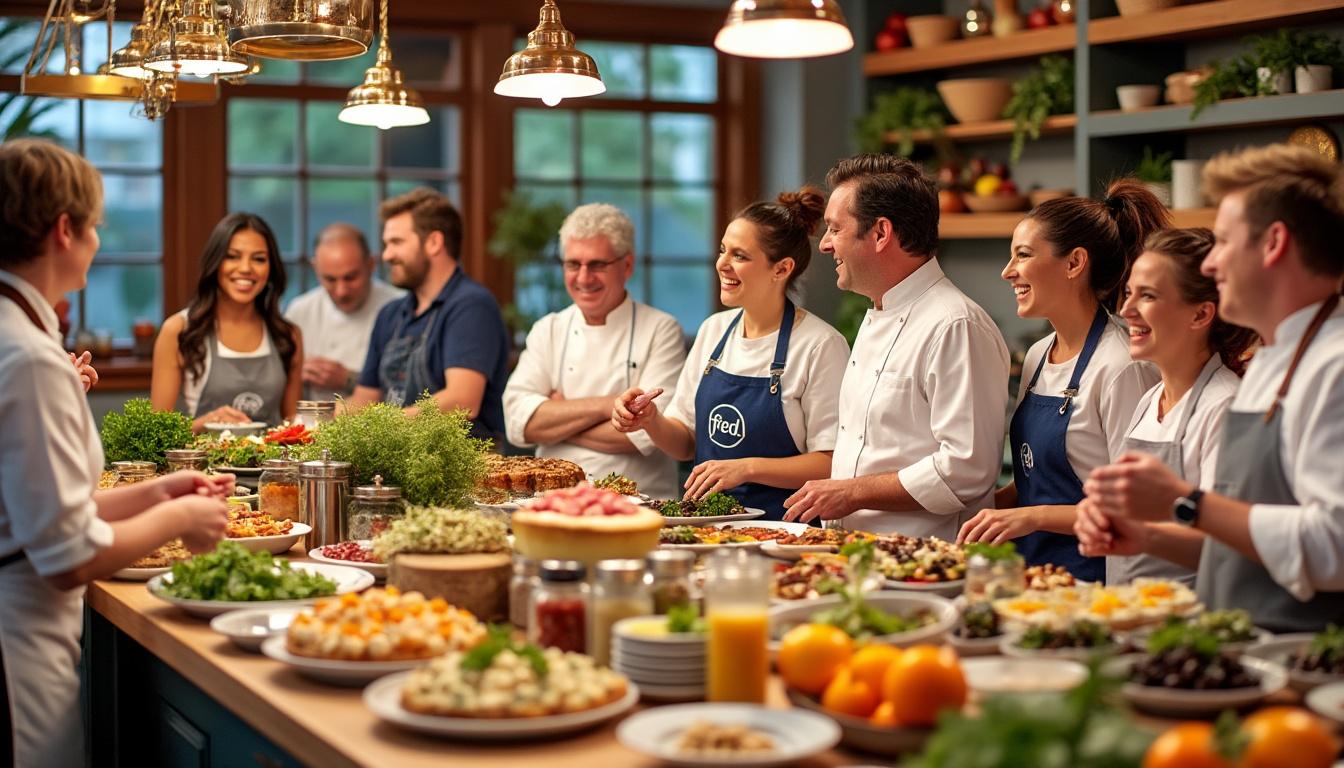Food Network bids farewell to The Kitchen after a decade; examine hosts, 40 seasons, fan reaction and what the change means for the network and weekend food programming.
Food Network‘s announcement that The Kitchen will end its run marks a turning point for weekend cooking television. After roughly ten years and more than 40 seasons, the show’s final episodes closed in December, leaving hosts and viewers to reflect on a format that blended recipes, banter, and celebrity guests. This report examines the timeline, the hosts’ contributions, and the implications for Food Network, sister channels, and the wider culinary-TV ecosystem.
Food Network Cancels The Kitchen: Timeline, Seasons and Final Episodes
The decision by Food Network to retire The Kitchen followed a long run that made the series a staple of weekend viewing. Final episodes aired in December, concluding a run that included frequent guest spots, cookbook promotions, and crossovers with other programs on the network.
For local restaurants and brands—like the fictional catering company Harper & Co.—segments on The Kitchen translated directly into menu demand and online orders. The program’s steady presence helped build trust between viewers and the show’s hosts, and that trust now shifts to other Food Network properties.
- Run: ~10 years, >40 seasons
- Final episodes: aired in December (final weekend run)
- Format: mix of recipes, product demos, guest chefs, and viewer Q&A
- Impact: boosted cookbook sales and local food businesses such as Harper & Co.
| Item | Detail |
|---|---|
| Network | Food Network |
| Show | The Kitchen |
| Hosts | Geoffrey Zakarian, Sunny Anderson, Katie Lee, Jeff Mauro, Marcela Valladolid (frequent contributor) |
| Seasons | 40+ seasons across roughly 10 years |
| Final Air Date | Final weekend episodes aired in December (network announcement preceded the final run) |
Key insight: the end of The Kitchen creates programming space on Food Network that will likely be filled by competitive formats and cross-promotions with shows such as Chopped and Guy’s Grocery Games.
How Hosts Geoffrey Zakarian, Sunny Anderson, Katie Lee and Jeff Mauro Shaped The Kitchen
The personalities at the center of the show elevated its appeal. Geoffrey Zakarian brought technique and restaurant insight; Sunny Anderson connected through approachable comfort food; Katie Lee added lifestyle crossover; and Jeff Mauro contributed playful, accessible recipes. Marcela Valladolid appeared regularly and reinforced the show’s community tone.
Hosts used the platform to support books, restaurants, and charitable efforts—moves that translated into measurable audience loyalty. The fictional caterer Harper & Co. noted increased bookings after a host-recommended recipe aired, illustrating the show’s commercial reach.
- Authority: hosts reinforced culinary credibility for Food Network.
- Approachability: recipes that viewers could replicate at home.
- Cross-promotion: cookbook and product tie-ins boosted ancillary sales.
- Community: frequent guest chefs and recurring contributors kept content fresh.
| Host | Role on The Kitchen | Notable Strength |
|---|---|---|
| Geoffrey Zakarian | Chef/Expert | Technique and restaurant stories |
| Sunny Anderson | Home-Cook Advocate | Comfort-food expertise |
| Katie Lee | Lifestyle and trend segments | Crossover appeal |
| Jeff Mauro | Entertaining and quick meals | Accessibility and humor |
Example: when Sunny Anderson highlighted a one-pan dinner, local searches and Harper & Co.’s weekly takeout orders spiked—an immediate indicator of influence. Insight: host-driven trust becomes intellectual property for the network even after a show’s end.
What The Cancellation Means for Food Network, Cooking Channel and the Wider Food-TV Landscape
The end of The Kitchen opens strategic opportunities across the Food Network portfolio. Expect renewed focus on competitive formats like Chopped and Guy’s Grocery Games, and potential cross-promotions with the Cooking Channel to capture daytime viewers. Advertisers and brand partners will reallocate budgets toward proven live-competition formats and digital-first content.
For small businesses and cooks following the show, this shift changes where audiences look for weekend recipe inspiration. Harper & Co. must diversify its media strategy to pitch to other shows and digital platforms, leveraging kitchen tips for seasonal menus and social content.
- Programming shift: more slots for competition and digital pilots on Food Network.
- Brand strategy: advertisers move toward high-engagement formats.
- Cross-channel play: Cooking Channel may absorb lifestyle segments.
- Local impact: restaurants must adapt promotional outreach to new programming partners.
Useful resources and further reading that connect culinary media trends with practical kitchen advice:
- Seasonal kitchen tips for monsoon cooking — useful for menu planning.
- How olive oil behaves at high temperatures — technical insight for chefs.
- Essential kitchen skills for home chefs — training ideas for staff.
- Kitchen hacks to save time and money — operational efficiency tips for caterers.
- How to organize a small kitchen — practical layout advice for pop-ups and food trucks.
Impact table: potential programming winners and audience shifts for 2025.
| Area | Likely Short-Term Effect | Opportunity |
|---|---|---|
| Competitive Shows | Increased promotion and viewer share | More prime weekend exposure for Chopped and Guy’s Grocery Games |
| Cooking Channel | Potential content reallocation | Acquire lifestyle segments and niche audiences |
| Local Businesses | Need to re-target media outreach | Pitch to digital-first food shows and social creators |
Practical step: brands like Harper & Co. should compile segmentable recipe content and reach out to producers of competition-led shows and digital series to retain visibility. Final insight: Food Network‘s lineup evolution reflects changing viewer habits—favoring immediacy and interactivity over long-form weekend talk formats.
Additional viewer resources and seasonal advice
Live-TV changes often prompt viewers to seek reliable cooking guidance online. The following links offer practical, immediate tips that mirror the sorts of segments viewers will miss from The Kitchen:
- Summer kitchen tips — stay efficient during peak season.
- Southern kitchen wisdom — inspiration for comfort-food menus.
- Diet, cooking and brain health — recipe ideas with wellness appeal.
- Managing grocery costs — budgeting tips for kitchens.
- Monsoon-ready kitchen adjustments — planning for disruptive weather.
Practical takeaway: viewers and businesses should pivot to curated digital content and targeted appearances as broadcast windows evolve.
Questions viewers are likely to ask now
- Will the hosts appear on other Food Network or Cooking Channel shows?
- How can small food businesses secure exposure without weekend talk shows?
- What programming will replace The Kitchen in weekend slots?
Closing insight for this section: audience habits change quickly—successful brands will follow where engagement migrates, not where legacy programming used to sit.
Common viewer and industry questions answered
Will The Kitchen hosts continue appearing on Food Network?
Yes. Hosts such as Geoffrey Zakarian, Sunny Anderson, Katie Lee, and Jeff Mauro often guest on other Food Network and Cooking Channel programs, and their presence is likely to persist across specials and competitions.
How does this affect shows like Chopped and Guy’s Grocery Games?
Competitive formats like Chopped and Guy’s Grocery Games stand to gain promotional space and may see increased investment as the network reallocates weekend resources.
What should small restaurants and brands do next?
Focus on versatile content: quick recipe videos, sponsor-friendly segments, and pitches tailored to competitive shows and digital series. Resources on organization and cost control—such as the guides on organizing small kitchens and kitchen hacks to save time and money—provide actionable steps.
How will viewer habits in 2025 influence network choices?
Streaming, short-form clips, and interactive content are priorities; networks will favor formats that drive immediate engagement and measurable ad performance. Expect crossovers between broadcast and social-first series.
Where can viewers find replacement weekend recipes and tips?
Digital hubs, social channels, and other Food Network shows will fill the gap. For hands-on tips immediate to kitchens, see seasonal and technical guides such as how olive oil behaves at high heat and essential kitchen skills for home chefs.

